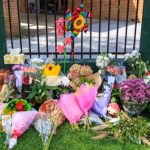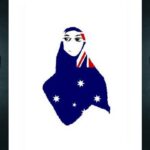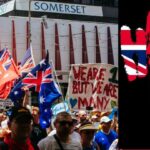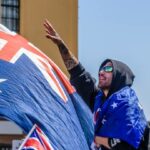ASIO Depoliticises Its Far-Right Surveillance Targets, Yet Continues Its Islamophobia

The largest and most devastating terrorist attack committed by an Australian national over recent times was the 15 March 2019 Christchurch massacre that saw an Anglo Australian gun down 51 Muslims worshipping at mosques on New Zealand soil.
This action was heavily motivated by right-wing white supremacist ideology. The Grafton-born man had even set out his political views in a 74-page manifesto.
Despite the incident obviously being a terror attack, the Australia media was slow to label it as one, as terrorism and the plethora of laws around it in this country are so closely associated with the Islamic faith, that the national psyche couldn’t quite grasp a white man perpetrating a terrorist act.
These days, Australia has an exceptionally broad volume of far-reaching terror laws compared to other liberal democracies.
This process was sparked by a post-9/11 UN resolution calling on states to pass terror laws. Yet, our country has now passed 94 national security/counterterrorism bills since 2001.
The linking of the act of terrorism to Islam has led to widespread demonisation of the Australian Muslim community. Although, this is slowly changing with domestic spying agencies now asserting that up to half their caseload is currently focused on far-right extremism.
And while this recognition that terrorism is not the sole domain of Muslims has been welcomed, it’s been pointed out that there’s a subtle distinction at play when the authorities refer to terrorism that continues to be associated with Islam, compared to when it’s associated with the right of politics.
Islam is not the threat
“Religion is strangely entrenched in our counterterrorism laws,” asserts Australian Muslim Advocacy Network (AMAN) legal advisor Rita Jabri Markwell. “No international law requires that religion be listed as a motive. In fact, most countries only refer to political motives.”
“While most self-declared Islamist organisations on Australia’s terrorism list would be easily labelled as politically motivated, our authorities and leaders make a concerted effort to call them religious,” the solicitor told Sydney Criminal Lawyers.
The Howard government passed the Terrorism Act 2002 (Cth). And amongst other things, the bill inserted section 102.1 into the Criminal Code (Cth), which defines a terrorist act as an action done or a threat made with “the intention of advancing a political, religious or ideological cause”.
Further aspects contained in this definition include that the act or threat involves serious harm, damage, death or endangerment, which is designed to coerce or intimidate any level of Australian government or that of a foreign country or is designed to intimidate the public.
“For more than two decades, these laws have validated and spread misinformation that religion, specifically Islam, causes terrorism,” Jabri Markwell added. “It is directly responsible for shaping misunderstandings about the relationship between Islam and terrorism in the mainstream media.”
The growing right-wing threat
There has long been a grassroots understanding around the bias in classing extremist ideologies and violent acts as terrorism if they’re linked to a Muslim person, while those linked to right-wing whites have been considered as Aussies going a bit off the rails.
But far-right terrorism finally gained official recognition when ASIO head Mike Burgess said in early 2020 that “the extreme right-wing threat is real and it is growing. In suburbs… small cells regularly meet to salute Nazi flags, inspect weapons, train in combat and share their hateful ideology.”
By October that year, the ASIO director general told a Senate Estimates hearing that thirty to forty percent of his agency’s surveillance work was then focused on “the evolving threat” of “right-wing extremists”, who were becoming more organised, sophisticated, ideological and active.
These 2020 public statements from the head of the domestic spying agency clearly display that the white nationalist threat is aligned with the right side of the political spectrum.
Indeed, the far-right is common parlance that describes these groups, as well as certain registered political parties.
But, as Jabri Markwell points out, after the right-wing threat had been identified, a subtle shift occurred.
By May 2021, Burgess told another Budget Estimates hearing that these white supremacist groups were then taking up 50 percent of ASIO’s workload, but the term “right-wing” had been erased, as the top spy was simply referring to them as “racists and nationalists”.
Ideology for some
“ASIO director general Mike Burgess indicated at his recent Annual Threat Assessment that agencies are now referring to right-wing extremism as racist nationalism in an effort to ‘depoliticise’ the labels,” the AMAN legal advisor explained.
Burgess set out on 9 February that COVID restrictions and vaccine mandates had led to an uptick in extreme organising, which could no longer be simply classed as solely right-wing or left-wing, and they were “best and most accurately described as ideologically motivated violent extremists”.
According to Jabri Markwell, being able to discuss the motivations of extremist groups, whether they be political or religious is important, but when it comes to authorities discussing these groups or enacting laws, it makes sense not to promote their propaganda by mirroring their narratives.
So, the solicitor can understand the point being made by Burgess in terms of not referring to racist nationalist movements, as being right-wing or patriotic, and instead to refer to them as being motivated by extremist ideology.
Yet, as she further points out, the government and its spying agencies have refrained from making such a distinction when it comes to groups that claim they represent the religion of Islam in their extremist actions.
“Authorities continue to refer to ISIL (Islamic State) as religiously motivated,” Jabri Markwell makes clear.
“The Muslim community does not accept or promote ISIL as a religious organisation, so why does ASIO?”
Maintaining the status quo
However, there are some clear discrepancies in Burgess’ 2022 Annual Threat Assessment. Soon after he announces that he’ll no longer be referring to racist nationalists as having “a specific point on the political spectrum”, he then turns his concerns to rising radicalisation amongst youths.
“Children as young as 13 are now embracing extremism, and this is happening with religiously motivated violent extremism and ideologically motivated violent extremism,” said the top spy.
“Teenagers are hanging Nazi flags and portraits of the Christchurch killer on their bedroom walls, and while others are sharing beheading videos.”
In this subtle shift, Burgess has removed the association that white nationalists with Nazi leanings and idealist thoughts about the Christchurch killer have with the far-right of politics simply because some were involved in the antivaxx movement. So, now, they’re solely ideologically motivated.
While other young people who “are sharing beheading videos”, which is an obvious reference to some Islamic State footage going back almost a decade, are still “religiously motivated”.
In this shifty redefining, the Liberal Nationals have been conveniently absolved of any association with white nationalist groupings, yet ultimately the Coalition will retain their vote in coming elections, while Australian Muslims will continue to remain a convenient community to demonise.
“The reality is, that we’ve seen a shift in language to benefit right-wing politics,” Jabri Markwell said in conclusion. “But it’s not a logic that’s been applied across the board.”







